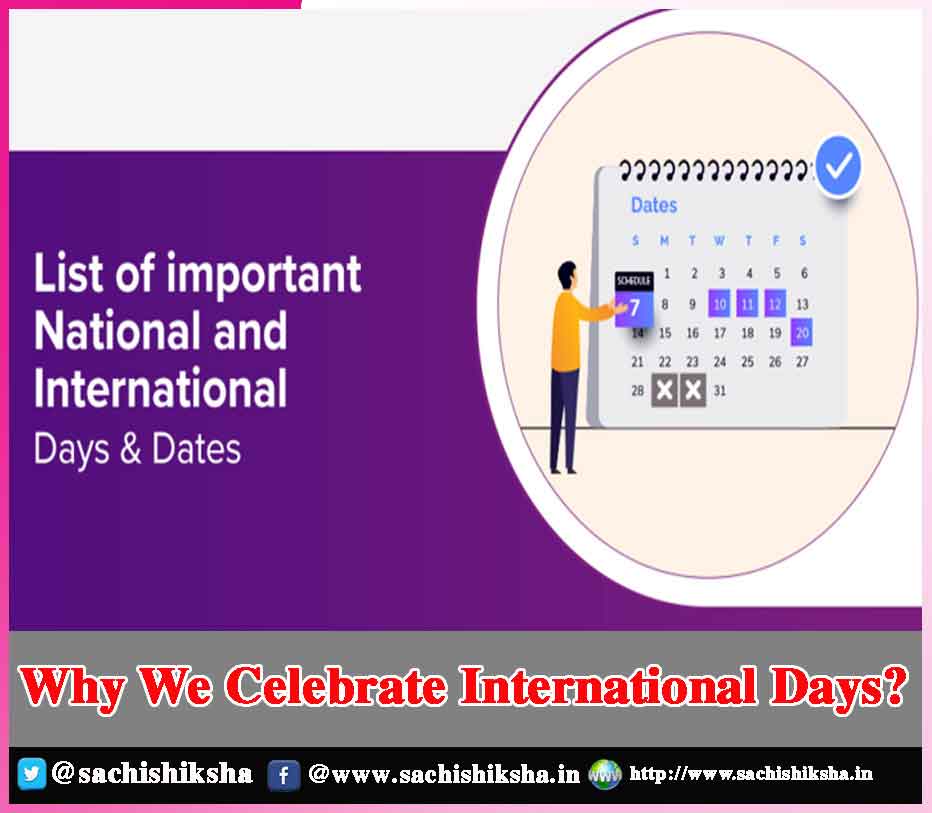Why We Celebrate International Days?
Introduction: The significance of commemorating International Days around the world is an organization’s effort to foster lasting peace and exchange information with mankind. Following the establishment of educational instruments, cultural heritage preservation, the attainment of sustainable development approaches, and numerous other things; organizations and agencies of the United Nations system, democratic institutions, the commercial and public sectors, schools, universities, and individuals in general use an international day to launch understanding and knowledge campaigns.
Also Read:

Most of the commemorations have been created by UN General Assembly resolutions, however several have been recognized by UN specialized organizations. The United Nations also commemorates important historical occurrences.
The United Nations now observes the following international days and weeks. The United Nations designates specific days, weeks, years, and decades as anniversaries to commemorate particular incidents or subjects in order to boost the organizational mission through action and education. Typically, one or more member countries suggest these traditions, and the General Assembly adopts them through a proclamation.
Occasionally these events are proclaimed by United Nations specialized organizations such as UNESCO, UNICEF, FAO, and others when they involve topics that fall within the area of their capabilities. Some of them may be approved by the General Assembly subsequently.
The General Assembly, the Organization’s most representational organ, declares a specific date to be an International Day. Member countries submit international days to the UN General Assembly. The General Assembly then votes by agreement whether or not to adopt the declaration designating the specific day.
Themes of international days are always connected to the United Nations’ core areas of operation, which include the preservation of world peace and security, the advancement of environmentally friendly progress, the safeguarding of human rights, and the enforcement of international law and post – conflict reconstruction.
The General Assembly normally discusses why it declared the International Day in its resolutions. The decision, for example, cited “the inter linkages among deprivation, malnourishment, lack of or inappropriate or unreachable health care services, early pregnancy and childbirth, underage marriage, violent behaviour against young women and girls, and sex discrimination as underlying causes of congenital abnormalities, and that deprivation remains the primary social significant predictor.”
Several people might have never heard of this condition, which produces a number of the most serious injuries that may occur during birth, despite the fact that that it affects two million women in impoverished nations and that 50,000 to 100,000 new cases are diagnosed each year. This is an excellent illustration of the vital awareness-raising work that International Days perform.
Furthermore, considering that the Council is made up of 193 countries, or the majority of the world’s governments, this UN body highlights in its resolutions those parts of the situation which are of the greatest importance to UN Member States – or, in other respects, to humankind in its entirety. The resolution designating June 23 as International Widows’ Day, in which the General Assembly expresses its “genuine concern” that “millions of children of widows confront circumstances of food insecurity, under nutrition, child labour, challenging access to health care, and drinking water and sanitation, lack of education, and people trafficking.”
Certain international days are declared not by the General Assembly; however by United Nations specialized organizations to bring global awareness to issues within their field of competence, such as healthcare, aviation, proprietary information, and so on. World Press Freedom Day, for example, was declared by the United Nations Educational, Scientific, and Culture Organization (UNESCO) in Paris and then accepted by the General Assembly.
In addition to promoting awareness, the UN uses these Days to counsel countries on how to address the significant issues that many of these occasions centre around. For example, on the International Day of Biological Diversity, May 22, the Organization asks its Member States to adopt and implement the Cartagena Protocol on the conservation of biological diversity.
The International Days also serve as a measure of the level of interest in a particular subject in different parts of the world. To discover out, researchers examine the amount of participation in such remembrance in various locations and cultures around the world.
The great example of showing the importance of celebrating International Day is “The International Day of Human Rights” which held on 10th December every year. This Day is honoured all across the world, with events ranging from police and military forces in South Sudan surrendering guns for jogging shoes to a student contest in Russia and a display in Brazil. Overall, a large number of people from all kinds of backgrounds participate in some way in the commemoration of this unique day.
There is a subcategory of International Days dedicated to the United Nations’ official languages. They were designed by the Department of Global Communications to acknowledge multilingualism and ethnic diversity, as well as to encourage the equitable usage of all six official languages within the Organization. As part of the programme, UN duty stations all around the world commemorate six distinct days, each dedicated to one of the Organization’s six official languages. Language Days at the UN strive to amuse as well as educate, with the purpose of raising knowledge and appreciation among the UN community for the heritage, tradition, and achievement of every one of the six official languages.













































